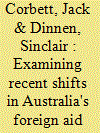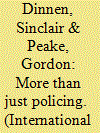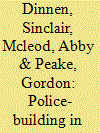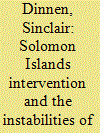|
|
|
Sort Order |
|
|
|
Items / Page
|
|
|
|
|
|
|
| Srl | Item |
| 1 |
ID:
143915


|
|
|
|
|
| Summary/Abstract |
On taking office in late 2013, the incoming Abbott government proclaimed the advent of a new aid paradigm. This article asks whether or not this is the case. It does so by situating the new coalition policy in the context of more than two decades of development thinking. Focusing on the way Australian aid policy reflects trends in both global development and geopolitical discourses, the article parses out continuity and change. It finds that Australia's new aid paradigm is in fact largely the old aid paradigm reincarnate, with aid policy continuing to follow the well-established parameters outlined over decades of global thinking and practice that emphasise the significance of private-sector-led economic growth. However, while the overarching paradigm remains relatively intact, incremental change is also apparent, including alterations to the geographic focus, level and administration of the program.
|
|
|
|
|
|
|
|
|
|
|
|
|
|
|
|
| 2 |
ID:
176482


|
|
|
|
|
| Summary/Abstract |
Two theoretical frameworks frame the spatial dimensions of organised crime. The first, which has shaped international responses to the problem, stresses the scalar and territorial nature of the problem; the second (and recently emerging) has drawn on network theories to suggest that organised crime is ascalar and operates through fluid relationships between people, places and things. We suggest that these viewpoints tend to bifurcate scalar and flat ontologies and argue that understanding and responding to organised crime requires engaging with theories of scale and networks simultaneously. We bring this theoretical insight to bear on a case study: we examine the way state power has shaped organised crime and responses to it across the Pacific. The case study highlights that responses to organised crime are by and large driven by scalar and state‐based responses, which have been shaped by political power. In contrast, organised crime constitutes networked relations that are significantly shaped by administrative and political scales. The paper argues that the disjuncture between the nature of responses to organised crime helps perpetuate the problem. It also highlights the advantages of greater dialogue between scalar and networked theories of organised crime.
|
|
|
|
|
|
|
|
|
|
|
|
|
|
|
|
| 3 |
ID:
127067


|
|
|
|
|
| Publication |
2013.
|
| Summary/Abstract |
Against the generally disappointing outcomes of international police reform in fragile settings, this article examines a New Zealand-supported community policing programme in post-conflict Bougainville. While the programme's engagement with the regular police organization has struggled for traction, support provided to an innovative and socially embedded policing initiative has produced promising results. The reasons behind these divergent outcomes and their implications for international policing are explored in the context of Bougainville's recent history, including the legacies of conflict and the new vision of hybrid policing in the post-conflict political settlement.
|
|
|
|
|
|
|
|
|
|
|
|
|
|
|
|
| 4 |
ID:
075017


|
|
|
|
|
| Publication |
2006.
|
| Summary/Abstract |
Australia is engaged in a range of police-building exercises with its regional neighbours. The character of this assistance has changed across time and space reflecting, among other things, the development of new approaches to police-building in weak and post-conflict states. This article examines three such approaches adopted in Papua New Guinea and Solomon Islands, respectively. Both countries comprise challenging development contexts marked by high levels of social diversity and topographical fragmentation, weak centralised states, resilient and largely self-regulating village-based societies, and police forces with limited reach, resources, and popular legitimacy. Among other things, the review of Australian police-building experience in the Pacific Islands indicates the need to engage more effectively with non-state actors and organizations in building appropriate and sustainable policing systems in such fragile national environments.
|
|
|
|
|
|
|
|
|
|
|
|
|
|
|
|
| 5 |
ID:
085719


|
|
|
|
|
| Publication |
2008.
|
| Summary/Abstract |
Shortcomings in the prevailing discourse of 'failed states' and the practical challenges of international state-building are examined in this article through a detailed case study of the Solomon Islands, a small independent Pacific island country that since mid-2003 has been the subject of a substantial Australian-led regional state-building exercise. The Solomon Islands intervention and the difficulties it has encountered are examined in the larger context of that country's longer history of state-building and the particular challenges posed by its colonial legacies, the nature of its modern political development and the manner of its integration into the global economy
|
|
|
|
|
|
|
|
|
|
|
|
|
|
|
|
| 6 |
ID:
078851


|
|
|
|
|
| Publication |
2007.
|
| Summary/Abstract |
In this paper we begin by defining and examining the concept of police building. Its historical precedents and contemporary forms are briefly reviewed, showing a variety of motives and agendas for this kind of institution building. We argue that police building has been a relatively neglected dimension of nation- and state-building exercises, despite its importance to functions of pacification and restoration of law and order. The emerging literature on international police reform and capacity building tends to adopt a narrow institutionalist and universalistic approach that does not take sufficient account of the politics of police building. This politics is multilayered and varies from the formal to the informal. Using two case studies focusing on events in 2006 in Timor-Leste and Solomon Islands, the reasons for the fragility of many current police-building projects are considered. In both cases, we argue, police capacity builders paid insufficient attention to the political architecture and milieu of public safety.
|
|
|
|
|
|
|
|
|
|
|
|
|
|
|
|
|
|
|
|
|